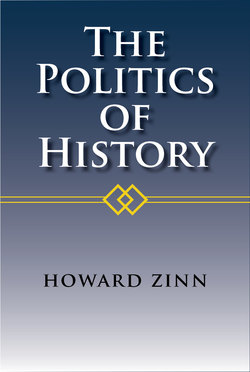Читать книгу The Politics of History - Howard Boone's Zinn - Страница 11
На сайте Литреса книга снята с продажи.
ОглавлениеIntroduction to the First Edition
Sometime in 1968, newspapers recorded the death of America’s leading entrepreneur of political buttons. He had always worn his own button which said: “I don’t care who wins. My business is buttons.”
The historian, by habit, is a passive reporter, studying the combatants of yesterday, while those of today clash outside his window. His preferences are usually private. His business is history.
He may ask philosophical questions about the past: do we find certain sequential patterns in history? or are historical events unique, disorderly? But he rarely sees himself as helpful in changing the pattern or affecting the disorder. He may believe that people through history have been caught in the grip of extrahuman forces. Or he may see them as free agents shaping the world. But whether they are free or not, he himself is bound—by professional commitment—to tally but not to vote, to touch but not to feel. Or to feel, but not to act. At most, to act after hours, but not through his writing, in his job as a historian.
Out of this sense of the situation comes the question which underlies this book: in a world where children are still not safe from starvation or bombs, should not the historian thrust himself and his writing into history, on behalf of goals in which he deeply believes? Are we historians not humans first, and scholars because of that?
Recall Rousseau’s accusation: “We have physicists, geometricians, chemists, astronomers, poets, musicians and painters in plenty, but we have no longer a citizen among us.” Since the eighteenth century, that list of specialists has grown, to include sociologists, political scientists, psychologists, historians. The scholars multiply diligently, but with little passion. The passion I speak of is the urgent desire for a better world. I will contend that it should overcome those professional rules which call, impossibly and callously, for neutrality.
My argument can be easily exaggerated (by me as well as by others), so let me say now what this book does and does not intend:
1. It does not aim to disengage history from the classical effort to be scientific, but rather to reaffirm the ancient humanist aims of the scientists (before military needs began to command so much of their talent), and to catch up with the new understanding in science about what “scientific” means. The physicist Werner Heisenberg put it this way: “Science no longer confronts nature as an objective observer, but sees itself as an actor in this interplay between man and nature.*
2. It does not argue for a uniform approach—mine or anyone’s—to the writing of history, and certainly not for the banning of any kind of historical work, bland or controversial, pernicious or humane, whether written for pleasure or profit or social objectives. Its aim is, by encouragement and example, to stimulate a higher proportion of socially relevant, value-motivated, action-inducing historical work.
3. It certainly does not call for tampering with the facts—by distortion or concealment or invention. My point is not to approach historical data with preconceived answers, but with preconceived questions.** I assume accuracy is a prerequisite, but that history is not praiseworthy for having merely achieved that. Freud once said some people are always polishing their spectacles and never putting them on.
The Politics of History has two kinds of essays. The essays in the first and third sections are about the writing of history. They proceed from a discussion of the uses of knowledge in general to historical consciousness in particular. In them, I try to argue for the notion of the historian as an actor, and this requires discussing many of the problems which fall, professionally speaking, within “the philosophy of history.” Is history “determined” or are we free to make our own? Can the historian justifiably write as a participant-observer in the social struggles of our time? Does “history as an act” lead to distorting the truth? What is the role of causality in history, of explanation? Should we be “present-minded” or “past-minded”? Analytical or speculative? And what of straight narrative as opposed to theoretical history? What is history for, anyway, and what is the responsibility of the historian? One of these essays suggests some criteria for a radical history.
The middle part of the book—the essays in history—represents an attempt to begin to meet those criteria for a radical history. These essays do not have the usual connective tissue of standard historical works; they do not deal with a specific period, or with all periods, or with one problem of the American past. What ties each to the others is a common purpose—to participate a bit in the social combat of our time. Whether or not the essays actually fulfill this aim, I leave to the reader to judge. I have my own doubts. My chief hope is to provoke more historical writing which is consciously activist on behalf of the kind of world which history has not yet disclosed, but perhaps hinted at.
